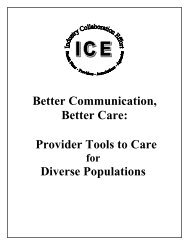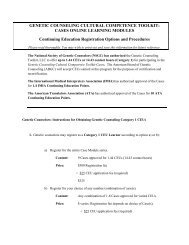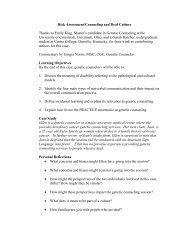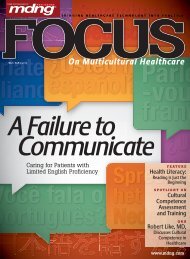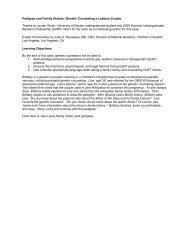Advanced Effective Communication, Cultural Competence, and ...
Advanced Effective Communication, Cultural Competence, and ...
Advanced Effective Communication, Cultural Competence, and ...
You also want an ePaper? Increase the reach of your titles
YUMPU automatically turns print PDFs into web optimized ePapers that Google loves.
A Roadmap for Hospitals<br />
Appendix E: Resource Guide<br />
care in a manner that is responsive to patient’s diverse<br />
needs <strong>and</strong> include. Four st<strong>and</strong>ards that reflect<br />
requirements for the provision of language service that can<br />
help organizations comply with Title VI of the Civil<br />
Rights Act. Available at http://www.omhrc.gov/assets/<br />
pdf/checked/finalreport.pdf.<br />
3. The Joint Commission’s Exploring <strong>Cultural</strong> <strong>and</strong> Linguistic<br />
Services in the Nation’s Hospitals: A Report of Findings<br />
provides a comprehensive conceptual framework for<br />
underst<strong>and</strong>ing hospital systems for meeting patient’s<br />
diverse cultural <strong>and</strong> linguistic needs. It contains<br />
recommendations for hospitals to improve their care <strong>and</strong><br />
a protocol for conducting interviews with key<br />
administrative staff. Available at<br />
http://www.jointcommission.org/patientsafety/hlc.<br />
4. The Joint Commission’s One Size Doesn’t Fit All: Meeting<br />
the Health Care Needs of Diverse Populations report<br />
provides a framework <strong>and</strong> self-assessment tool for<br />
considering how your organization is meeting its patients’<br />
needs. Based on the premise of continuous assessment <strong>and</strong><br />
monitoring for improvement, this guide also provides<br />
example practices from a study of 60 hospitals from across<br />
the country. Available at http://www.jointcommission.org/<br />
patientsafety/hlc.<br />
5. A Comprehensive Framework <strong>and</strong> Preferred Practices for<br />
Measuring <strong>and</strong> Reporting <strong>Cultural</strong> Competency from the<br />
National Quality Forum outlines a comprehensive<br />
framework for measuring <strong>and</strong> reporting cultural<br />
competency. The report details 45 preferred practices for<br />
providing culturally competent care covering a range of<br />
issues, including communication, community<br />
engagement, <strong>and</strong> workforce training. Available at<br />
http://www.qualityforum.org/Publications/2009/04/<br />
A_Comprehensive_Framework_<strong>and</strong>_Preferred_Practices_<br />
for_Measuring_<strong>and</strong>_Reporting_<strong>Cultural</strong>_Competency<br />
.aspx.<br />
6. The American Medical Association’s Ethical Force ®<br />
program used its formal consensus process to develop a<br />
360-degree organizational communication climate<br />
assessment toolkit (OCCAT), which was then validated in<br />
a 4-year national field test. The OCCAT surveys <strong>and</strong><br />
other materials (including a Resource Guide for QI in<br />
each domain) are available online for free at<br />
http://www.EthicalForce.org. In addition, the Ethical<br />
Force Program’s Improving <strong>Communication</strong>—Improving<br />
Care resource guide includes a comprehensive framework<br />
for considering how heath care systems support effective<br />
communication including how to integrate these concepts<br />
into ongoing organization quality improvement efforts.<br />
Available at http://www.ama-assn.org/ama1/pub/upload/<br />
mm/369/ef_imp_comm.pdf.<br />
7. Multicultural Health Best Practices Overview from Diversity<br />
Rx provides information about best practices in delivering<br />
medical services to people from a wide variety of cultural<br />
<strong>and</strong> linguistic backgrounds. Available at<br />
http://www.diversityrx.org/best.<br />
8. National Public Health <strong>and</strong> Hospital Institute offers<br />
several resources including the following:<br />
• Serving Diverse Communities in Hospitals <strong>and</strong> Health<br />
Systems: From the Experience of Public Hospitals <strong>and</strong><br />
Health Systems presents the applicable strategies from<br />
the various programs <strong>and</strong> approaches currently<br />
underway in National Association of Public Hospitals<br />
<strong>and</strong> Health Systems hospitals by presenting findings<br />
<strong>and</strong> lessons learned from case studies <strong>and</strong> a focus group<br />
<strong>and</strong> the development of a toolkit. Available at<br />
http://www.naph.org/Publications/servingdiverse<br />
communities.aspx.<br />
• Assuring Healthcare Equity: A HealthCare Equity<br />
Blueprint outlines a framework for hospitals to address<br />
racial <strong>and</strong> ethnic disparities in health care. Available at<br />
http://www.naph.org/Main-Menu-Category/Our-Work/<br />
Health-Care-Disparities/EquityBlueprint.aspx.<br />
9. The American Organization of Nurse Executives’ Diversity<br />
in Healthcare Organizations Toolkit helps health care<br />
leaders in supporting diversity efforts within their<br />
organizations. It includes sections on case studies, policy<br />
statements, educational materials, measurement st<strong>and</strong>ards<br />
<strong>and</strong> assessment tools, job descriptions <strong>and</strong> performance<br />
measures, evidence-based practice/research, recruitment<br />
<strong>and</strong> retention strategies, statements of organizational<br />
values, <strong>and</strong> other resources. The toolkit is an AONE<br />
members-only benefit <strong>and</strong> can be viewed in the resource<br />
section of the AONE Web site Available at<br />
http://www.aone.org/aone/resource/gps.htm.<br />
10.National Committee for Quality Assurance’s Multicultural<br />
Health Care: A Quality Improvement Guide follows<br />
the steps of a basic quality improvement process: assessment,<br />
planning, implementation, <strong>and</strong> evaluation. Each chapter<br />
contains explanatory text, information on how to follow the<br />
process <strong>and</strong> resources <strong>and</strong> examples from a variety of<br />
settings. Available at http://www.clashealth.org.<br />
11.The Management Sciences for Health Web site The<br />
Provider’s Guide to Quality <strong>and</strong> Culture is designed to help<br />
78



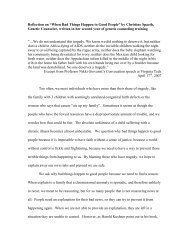
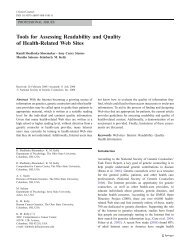

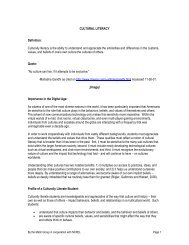
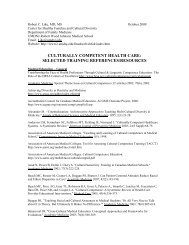
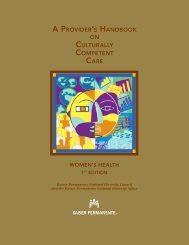
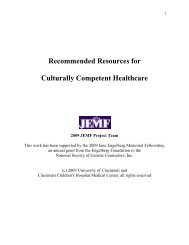
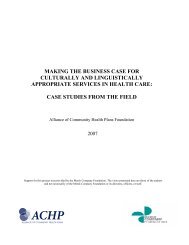
![Breaking Bad News PPT[1] - Genetic Counseling Cultural ...](https://img.yumpu.com/35003134/1/190x146/breaking-bad-news-ppt1-genetic-counseling-cultural-.jpg?quality=85)
